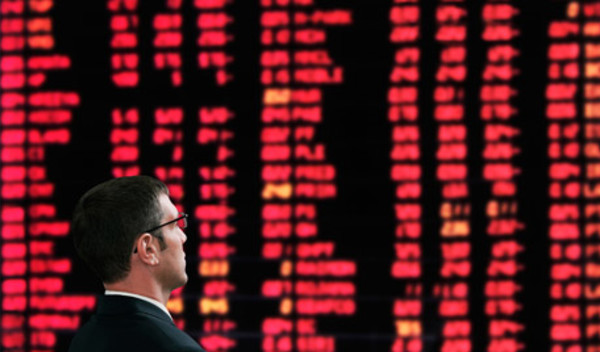

The S&P 500 index of US shares was down 1.44 per cent while the technology-focused Nasdaq was down more than 2 per cent.
Meanwhile the Euro Stoxx Index is down 0.4 per cent at the time of writing as investors fear disruption to the Eurozone from the current dispute between the Italian government and the country.
Fears about the pace of US interest rate rises and consequently higher bond yields mean investors are concerned about stocks.
Luca Paolini, global strategist at Pictet said: "Investors looking for what is behind the market wobble are spoilt for choice.
"One culprit is the US Federal Reserve. Earlier this month, Fed chairman Jay Powell took markets by surprise with a warning that US interest rates were still 'a long way' from what the central bank considers ‘neutral’.
"Bonds duly fell – the yield on the 10-year US Treasury note is almost 20 basis points higher than before the Fed chair’s hawkish turn."
But Mr Paolini said despite the uncertainty gripping markets, he didn't believe a sharp downturn in markets is imminent.
Marcus Brookes, head of multi manager investing at Schroders, said the technology sector had fallen most within the broad fall associated with US shares, partly because those were the assets that rose by the most when markets were bouyant.
He added that the growth style of investing, which centres on buying companies based on expected future earnings, had dominated markets in recent years but was falling from favour because as bond yields rise, gambling that future earnings will be as high as expected by the share price was less attractive when the income from bonds, which should be more certain, was available immediately.
This had prompted Mr Brookes to reduce exposure to the US market, where growth shares have been strong, and turn to the UK, where valuations were lower.
Greg Bennett, fund manager at European equity specialists Argonaut, said many European banks, though not Italian ones, were trading at low valuations, and have stored up sufficient capital that there is a "buffer" for investors.
Joshua Mahony, market analyst at IG Group, said data showing the slowest rate of Chinese GDP growth since the financial crisis has also hit sentiment towards European equities. This was because many European companies have substantial exposure to emerging markets, as they are export led businesses.
Mr Paolini said: "There are signs that the trade dispute between China and the US is beginning to weigh on the world economy. Not only have global indices of manufacturing activity recently declined to a two-year low, but there has also been a spike in the number of companies cutting profit forecasts.
"The ratio of earnings upgrades to downgrades is now at minus 17 per cent, the lowest since the middle of 2016."
Nick Ford, who jointly runs the £585m Miton US Opportunities fund, said the US economy was more self contained than much of the world, with companies not relying on global growth to thrive. This had prompted him to invest more in small and mid cap companies.
Jacob De Tusch Lec, who runs the £4bn Artemis Global Income fund, said many investors were ignoring the relative health of the global economy and switching to defensive assets.
He said: "In parallel with this political uncertainty, some investors are looking beyond the fact that, by post-crisis standards, economic growth is rapid and shows little immediate sign of slowing. Instead, they are jumping ahead and anticipating the end of an economic cycle that has grown somewhat long in the tooth.
"So rather than owning economically-sensitive value stocks, they are hunkering down, preparing for a slowdown by moving back into low-beta, defensive stocks such as consumer staples and utilities. For this group of investors, today’s valuations don’t much matter."
Brian Dennehy, who runs adviser firm Dennehy Weller said investors should "ignore the noise" in markets and continue to deploy the same fund selection strategy as they always do.
david.thorpe@ft.com




